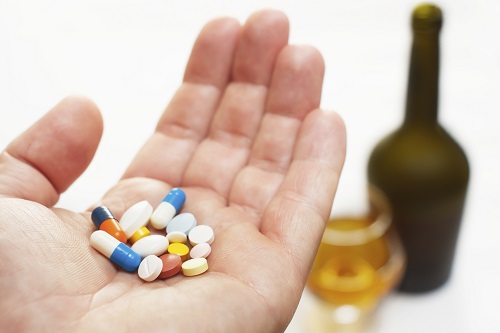Doctors often say that alcohol can't be taken together with antibiotics. Well, actually, not only antibiotics, most drugs must not be taken with alcohol. Drinking alcohol while you’re on medication may interfere with the drug’s function and can even cause side effects. Read more about the effects of using alcohol beverages and antibiotics together.

Why You Shouldn't Take Alcohol and Antibiotics Together
If you are fighting an infection and taking antibiotics, it is not in your best interest to drink alcohol. Generally speaking, alcohol drinking can cause dehydration, sleep disturbance, and delayed healing of the body from infection. Furthermore, antibiotics may interact with alcohol and cause serious side effects.
The Mix Can Cause Side Effects
Take metronidazole for example, which is a common antibiotic used to fight infections of the skin, stomach, intestine, joint or lungs. Taking alcohol and some antibiotics like metronidazole may result in a “disulfiram-like reaction”. This reaction may cause symptoms such as:
- Nausea/vomiting
- Skin flushing
- Stomach cramps
- Headache
- Rapid heart beats
- Difficulty breathing
- Chest pain
Other antibiotics that may produce a similar reaction when taken with alcohol include cefotetan and tinidazole. It is highly recommended that you avoid drinking alcohol while using these antibiotics and for another 3 days (72 hours) after you have stopped taking the antibiotics.
Metronidazole can also affect the central nervous system (CNS) and cause side effects when taken with alcohol. These include drowsiness, dizziness, confusion, or sedation. These effects can be serious, especially in elderly patients, in patients who are taking other CNS depressant drugs to relieve anxiety, pain or seizures, and in patients who drive or use heavy machinery.
Fortunately, in most cases, the side effects of mixing alcohol and antibiotics do go away without treatment. However, if your symptoms are severe, call emergency medical services (911) or the local emergency service number.
Alcohol May Affect the Effectiveness of Antibiotics
Alcohol is broken down by enzymes in your liver. The liver also metabolizes most drugs, including antibiotics. Depending on how much and how often you consume alcohol, your liver’s ability to break down drugs in your body may be altered.
On the other hand, if you drink alcohol chronically, as in alcoholism, your liver enzymes may be “induced” to work more, causing more efficient drug metabolism. This could lead to decreased drug levels in the body, which could reduce their ability to fight infection.
Guidelines on Alcohol and Antibiotics Use
Ask your doctor how long you shouldn’t drink alcohol after your antibiotic therapy. Listen to the doctor’s advice to avoid the side effects of alcohol-drug interaction. Here are more general guidelines:
|
Interacting Antibiotics |
Recommendation |
|
Sulfamethoxazole/trimethoprim |
Avoid alcohol while taking this drug. |
|
Metronidazole |
Avoid alcohol during treatment and for 3 days after discontinuing treatment. |
|
Linezolid |
Avoid beer, vermouth, and red wine. |
|
Tinidazole |
Avoid using alcohol during treatment and for 3 days after discontinuation of treatment. |
|
Cefotetan |
Avoid alcohol during treatment and for 3 days after discontinuing treatment. |
|
Rifampin |
Avoid alcohol while taking this drug. |
|
Isoniazid |
Avoid alcohol while taking this drug. |
|
Cycloserine |
Avoid alcohol while taking this drug. |
|
Ethionamide |
Avoid excessive alcohol intake. |
|
Voriconazole |
Avoid alcohol while taking this drug. |
|
Ketoconazole |
Avoid alcohol while taking this drug. |
|
Pyrazinamide |
Avoid using this drug if you are an alcoholic or if you use alcohol daily. |
|
Thalidomide |
Avoid or limit alcohol intake while taking this drug. |
Beware of Hidden Sources of Alcohol
You already know that you can't mix alcohol and antibiotics. But alcohol is not limited to beer, wine, or liquor. Many over-the-counter medicines such as cough medications and mouthwashes may contain some alcohol. Aside from these, prescription drugs may also have alcohol. Check the labels for inactive ingredients such as alcohol. Ask your physician/pharmacist for possible drug-drug interactions.
